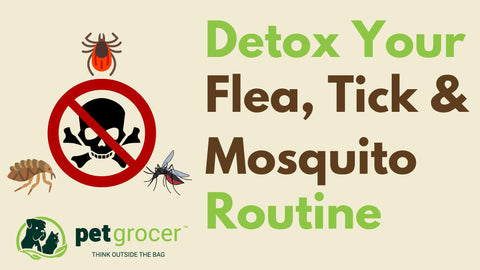Detox Your Pet’s Flea & Tick Prevention

Our pets’ bodies are constantly in contact with chemicals in our environment. When it comes to flea, mosquito, and tick season we and our pets have options. When we choose to help lessen the toxic loads on their bodies, we help make positive changes to their health and longevity. Spot treatments may have great marketing campaigns and ease of use, but a quick google search will show you the toll they take on the body month after month has caused numerous documented side effects, and even death. This year consider a change and choose a safer, healthier choice for your pet and your whole family.
- Safe Repellents: There are many essential oils (lemongrass, lavender, cedar wood, neem, to name a few) that are safe for use on our pets, and also highly effective at repelling biting insects. Regularly applying these topical repellents to your pet & their collars or bandannas keeps bugs from wanting to bite your pet. This helps protects them from the itchiness of bug bites, and also helps to prevent diseases such as heart worm, lyme disease, and parasites. These sprays can often be used indoors as well on pet beds, rugs and blankets to help keep your home uninviting to pests. If you are ready to ditch the chemical treats and spot treatments, Pet Grocer makes a ready to go pet spray called Defense that can be used on your pet & family (click here for the cat friendly Feline Defense). We also stock biobased Kin+Kind Flea+Tick Repel Spray.
- Edible Protectors: There are edible herbs and foods like garlic that can both repel and control fleas & ticks. Products like Earth MD: Outdoor Shield combine quassia bark, neem leaf, and garlic. Quassia and neem contain compounds (quassin and azadirachtin, respectively) that are toxic to insects, but not mammals. When your pet consumes it, these compounds go into their bloodstream and spread throughout their body. When a bug bites them, these compounds make it so the insects cannot eat or reproduce, and then they die. Garlic has often been added to edible flea deterrents as it changes the scent your pet gives off making them less desirable to fleas.
- Outdoor Pest Control: Protecting where you pet spends time is just as important as treating your pet. Make sure to remove standing water and brush piles where mosquitoes & ticks enjoy breeding. Choose safe lawn products that combat pests like nematodes and lawn sprays made with cedar or garlic oil.
- Vacuum and wash pet beds and floors regularly during flea season. If a flea makes it indoors, give them the boot and send them packing by way of sucking them up and tossing them away. Vacuuming and cleaning areas your pet frequents will pick up live bugs & eggs helping to stop the flea life cycle!
- Check your pet’s body regularly especially after outdoor play. Run your hands along their underside feeling for ticks as well as in and around ears and paws. Brush them to remove any bugs and debris they may have picked up and make sure to check areas like the base of the tail for ‘flea dirt’ (a.k.a. flea poop).
- Feed Fresh & Healthy foods: Feeding fresh foods has shown to lead to healthier pets. A pet with a strong immune system is a not a good host to parasites and disease.
- Ensure you are prepared in case you or your kids or pets do end up getting bitten by a tick and use a safe way to remove them. Check out the easiest to use tick key out there and keep one on your keychain this summer.
Switching from the convenience of once a month drops to a regular pest routine may seem like extra at first, however, once you get in the groove it is just like your applying sunscreen and bug spray to your family in preparations for outdoor activities. The benefits from ditching chemical laden oral and topical pesticides are HUGE! Your pet’s body will thank you for not burdening it with a heavy toxic soup. Less toxins will hopefully lead to a healthier immune system, fewer sensitivities, and add longevity to your pet’s life.
Be sure to subscribe to our podcast Get Fresh with Jenn at Pet Grocer for more tips and insights.

